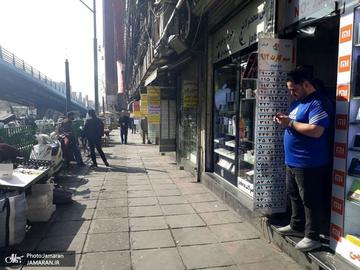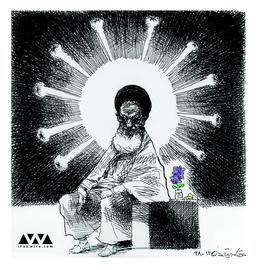Iran is experiencing one of its biggest social crises in its recent history. The coronavirus outbreak in the country has led to widespread fear and massive disruption to the daily routine of every aspect of society. Businesses large and small have all been affected in different ways and to different degrees.
The streets in Tehran and many other cities in the country are empty, schools and universities are closed, office hours have been cut in many cities, including in the capital. People are sharing photographs of shopping malls and markets, with many small shops and stalls closed or operating in a very minimal way. Many people are not leaving the house except in emergencies.
The coronavirus outbreak has had devastating effects on the economy in every country, but in Iran it is far more profound. Coronavirus is not the first major crisis to hit Iran in recent years, so it is the last thing the country needs.
The Fragile Iranian Economy
Before calculating the economic impact of coronavirus, it is important to assess the exact situation of the Iranian economy.
According to IMF statistics, Iran's economy shrunk by 15 percent in 2018 and 2019. Iran's economic growth was -4.8 percent in 2018 and -9.5 percent in 2019. Since then, Iran's population (assuming an annual growth rate of 1.24 percent) has grown by about 2.5 percent. If these figures are included in calculations, we will reach the unfortunate conclusion that the economic power of every Iranian person has decreased by about 18 percent in the last two years, or in other words, Iranians have one-fifth less food and other necessary goods.
The issue is not limited to the recession. Inflation and the devaluation of the national currency are also compounding the problem, a phenomenon with diverse consequences, the largest of which is the exacerbation of instability and the intensification of a broader class divide. This instability reduces hope of reform and the widening of the class divide makes the distribution of the recession even more unbalanced. Certainly, a large portion of the population of Iran has been badly affected by the economic downturn, just as some have benefited hugely from the crisis.
In a society where, according to official statistics, the average inflation rate is at 40 percent, the threshold of tolerance and the fragility of society is much lower than that of a normal society.
Coronavirus Estimated to Have Caused Loss of $2.80 a Day, or $86.60 a Month, Per Person
So what will be the coronavirus crisis’ specific impact on the Iranian economy?
Given the closure of schools, the closure of offices in major cities, and the disruption to public businesses, it can be assumed that half of Iran's economy is currently shut down because of coronavirus.
Leaving the oil sector to one side and excluding revenue from that industry and focusing only on other sectors, according to Iranian Statistics Center reports, Iran's GDP at current prices by the end of autumn 2019 was about US$133 billion. Dividing this figure by the number of days of the first nine months of the year (276 days), it can be concluded that the total daily GDP of Iran is more than $480 million.
According to this calculation, the loss of Iran's semi-closed economy is estimated at about $242 million per day. It is unclear how Iran's fragile economy can cope with this situation.
If this figure is divided by the whole population of Iran, it amounts to a figure of about $2.80 a day, or $86.60 a month, which is slightly less than minimum wage.
Coronavirus’ Dual Destruction
So the balance of this loss is not evenly distributed — meaning that everyone in Iran does not have an equal share of this loss.
For example, the amount of damage inflicted on travel agencies over the last few months has skyrocketed. Even before the outbreak of COVID-19, the foreign tourism sector in Iran suffered significant loss after the Revolutionary Guards’ shot down a passenger aircraft — a horrific event that badly affected domestic tourism as well. At the same time, it is estimated that the share of tourism in the total economy of Iran is about 3 percent, which is very significant even in a crisis-hit economy such as Iran.
In addition, many service activities have also been affected. Take the example of a hypothetical situation of a shopkeeper in a shopping center having to pay $1,350 a month in rent; it is unclear how he will manage the cost of rent after the outbreak of COVIDA-19 and a sharp decline in sales revenue.
The industrial sectors, which were struggling badly and barely surviving even without the COVIDA-19 outbreak, are in crisis. Workers — in particular, temporary workers — in industrial towns have felt the immediate impact of coronavirus, as their day-to-day activities have been vastly reduced and curbed. This situation will continue in the future as the public purchasing power drops and the crisis intensifies because of the shrinking market for industrial products.
This dual characteristic of the coronavirus hits people twice: First as the outbreak strikes and then again when it impacts production in different sectors of the economy as the crisis intensifies and public revenues decline.
This coronavirus “bomb” has not hit a solid building, but rather fallen on a ruined house that was badly dilapidating day by day, even before the current crisis even began to unfold.
visit the accountability section
In this section of Iran Wire, you can contact the officials and launch your campaign for various problems



























comments